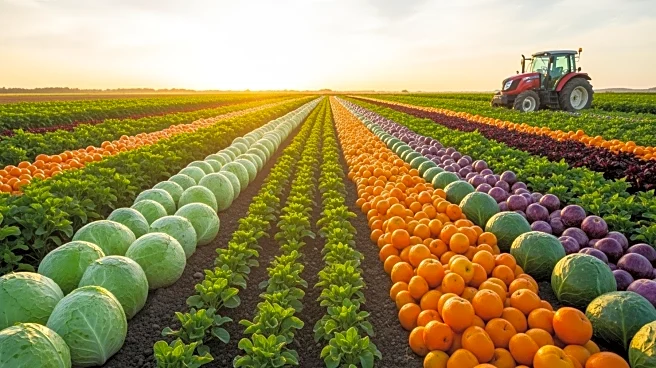What's Happening?
Andre Anderson, President of the Clarendon Association of Branch Societies within the Jamaica Agricultural Society (JAS), has urged Jamaicans to modernize the agricultural sector to unlock economic potential.
Anderson emphasized the need for a shift from traditional practices to a research-driven approach, highlighting agriculture as a key to economic independence. He noted that despite Jamaica's reputation for high-quality produce, the country struggles with large-scale production and export readiness. Anderson pointed out that only a small fraction of Jamaica's arable land is cultivated, and small farms dominate the landscape, limiting scalability. He identified several crops, such as ackee, breadfruit, mangoes, and coconuts, as underutilized resources with significant export potential.
Why It's Important?
The call for modernization in agriculture is crucial for Jamaica's economic growth and sustainability. By transitioning to a more research-driven and innovative agricultural sector, Jamaica can increase its export capacity and create wealth. This shift could lead to increased employment opportunities, particularly in rural areas, and contribute significantly to the national GDP. The emphasis on agro-processing and technology-based solutions could enhance the country's global competitiveness and reduce reliance on imports. Furthermore, establishing a dedicated hub for agricultural science and technology could prevent brain drain and retain skilled professionals within the country.
What's Next?
Anderson's call to action suggests several potential developments, including the establishment of a Jamaican equivalent of Silicon Valley focused on agricultural innovation. This could involve creating long-term financing mechanisms tailored to the agricultural sector, encouraging investment in research and technology. Policymakers may need to address the challenges of short loan tenures and high interest rates to support farmers and agro-entrepreneurs. Additionally, there may be efforts to increase the cultivation of key crops and improve consistency in supply to meet export demands. These steps could pave the way for a more robust and sustainable agricultural industry in Jamaica.
Beyond the Headlines
The modernization of Jamaica's agricultural sector could have broader implications, such as enhancing national pride and cultural identity through the promotion of 'Brand Jamaica.' It may also lead to ethical considerations regarding land use and environmental sustainability. The focus on innovation and technology could foster a culture of entrepreneurship and creativity, attracting young talent to the sector. Long-term shifts in agricultural practices could also influence dietary habits and food security, contributing to healthier communities.








